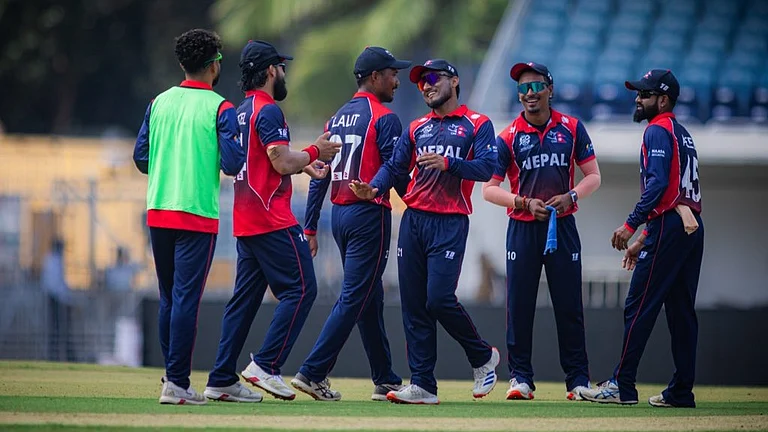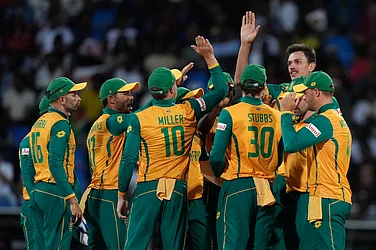Even before the famed spin quartet arrived, giants like Subhash Gupte ("He could turn the ball on a glass table," Sir Gary Sobers would say), Vinoo Mankad and Ghulam Ahmed did India proud. Lesser mortals like Baloo Gupte, Jasu Patel, V.V. Kumar, Chandu Borde, Bapu Nadkarni, Salim Durrani, Rajinder Goel, Paddy Shiv-alkar, Anand Shukla, Shivlal Yadav and Dilip Doshi now appear to have been born in awfully wrong times. I played with or against most of them and I used to admire them for the intensity of their involvement in their craft.
My association with E.A.S. Prasanna, Chandrashekhar and Venkataragha-van, of course, was something very special. The fact that I was part of the quartet was an honour I will cherish as long as I breathe. I had the privilege of playing against some of the world's best spinners—Gibbs, Underwood, Intikhab Alam and Mallett. But I just cannot imagine there were better or more consistent matchwinners than Prasanna and Chandra or tougher competitors than Venkat, a teamman to the core.
We all had different approaches to our craft, but we were immensely proud of each other. And, of course, we worked in unison for the team's sake. All four of us made the international grade before touching 20. Which meant the process of complementing each other lasted for a fair period. That is all behind us. There is nothing anybody can do to recapture the past for the benefit of the present, which is pretty gloomy; or for the future of which we are not sure anyway.
The sensible thing to do is to analyse the present, which as the title of this essay would indicate, is nothing to rave about. The blame lies squarely with our myopic cricket administrators.
No, I am not in a tearing hurry to tear apart all and sundry for the sad demise of the subtle craft of tossing the ball up and teasing the batsman to his doom. Actually, the modern spinner is generally a confused character. All because of a single factor—the synthetic charm of one-day cricket. We have had so much one-day cricket in the last two decades, it is not funny. International cricket is being governed today by television, which has done more harm than good.
The specialist spinner is the foremost victim of one-day cricket. To cite one outstanding casualty, Anil Kumble. Critics are quick to remark that Kumble was never a great spinner of the ball. Point conceded. But his Test record is pretty impressive. I am sure Kumble would be the first to admit that he is not happy firing it in simply to contain the batsman. A paucity of wickets against his name has allowed the Indian "bunch of jokers" to dispense with Kumble's services. According to Mushtaq Mohammad, my colleague from my Northamptonshire days, "the plight of the spinner in general is tragic. Barring Shane Warne and Saqlain Mushtaq, there aren't many genuine spinners of the ball. And those who do turn the ball have suspect actions". Bob Simpson's recent report would bear testimony to this fact.
We may have to adopt the Australian method of selecting two sets of players—one for Test cricket, the other for one-day matches. I am also convinced that if the spinner is to play an important role in one-day cricket, the 30-yard circle regulation needs to be reassessed. As it stands, the inner circle is not small enough to save a single nor is it big enough to prevent an improvised slog. I would strongly advocate the use of two fielders in catching positions throughout the course of the game. I repeat 'catching' as opposed to 'stationary' positions, as is in vogue. We must help spinners cultivate the wicket-taking habit instead of turning them into defensive bowlers.
The battle of wits must be top priority for spinners in any form of the game. In the Indian context, the decision to cover the wickets is most abysmal. Even in England, covered wickets have eradicated the "deadly" Underwood element. Uncovered wickets and mowing on alternate days will give some incentive to the Indian trundler, be he purveyor of pace or spin. We all know cricket is a bats-man's game. But to win a game, the opposition has to be bowled out twice. So the role of a bowler can never be undermined.
The Indian spinner has suffered hugely at the hands of our national selectors. Honestly, I can't imagine a worse selection panel ever performing this onerous task. Our great business in life is not to see what lies dimly at a distance, but to do what lies clearly at hand. Austere perseverance, harsh and continuous, rarely fails. Its silent power grows irresistibly greater with time. To the aspiring Indian spinner, I'll only say, in Lord Tennyson's words, your job is "to strive, to seek, to find and not to yield".
























